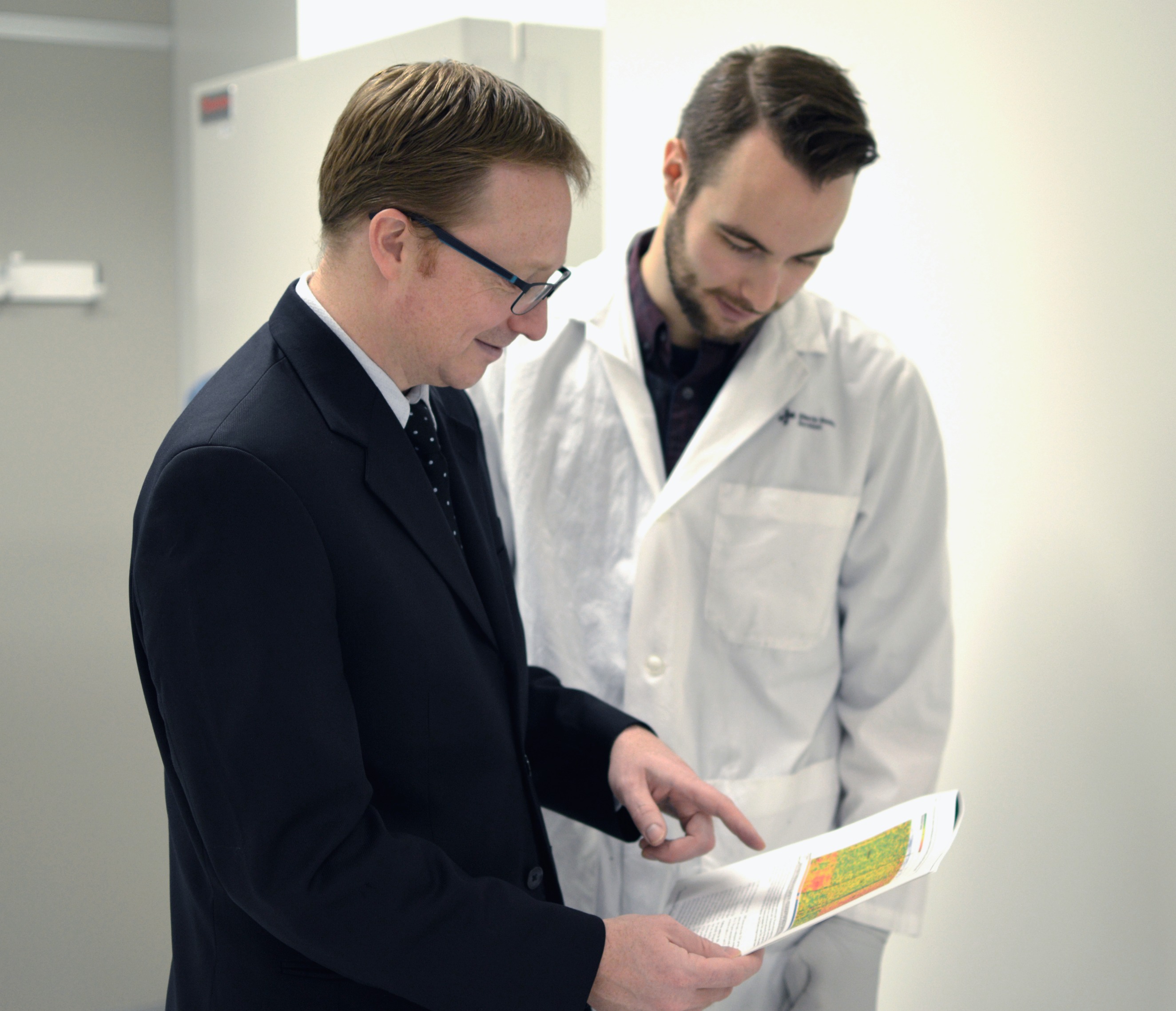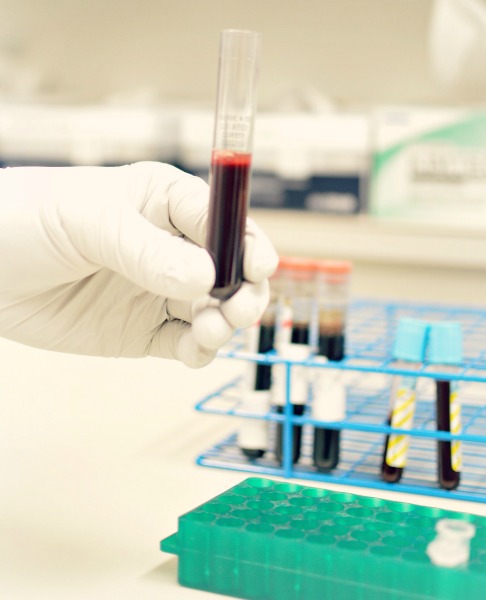
Dr. Glen Jickling mentoring a research team member in his new UAlberta laboratory.
"There's a very strong clinical stroke program in Alberta," says Glen Jickling. "Some of the best stroke care in the world is happening right here."
Jickling is a clinical neurologist and assistant professor who specializes in stroke research and treatment. His interest in stroke sparked during medical school while working at the University of Alberta Hospital's stroke clinic; after many years in the United States, he has returned to the U of A.
From Alberta and back
Born and raised in Calgary, Jickling did his undergraduate training at the University of Calgary. He then attended medical school and completed a neurology residency at UAlberta.
After residency, Jickling moved to Sacramento to do a research fellowship in stroke genetics and genomics at University of California, Davis. He was an assistant professor there for two years. He has always been intrigued by the complexity of the brain and how it works. His career has been driven by a desire to understand how disease occurs in the brain and how it can be treated.
"Working with the outstanding stroke programs in Alberta is an exceptional opportunity," says Jickling. "Alberta's stroke care is something to be very proud of."
Being back in Alberta isn't just valuable for his research. Jickling is happy to be close to family and friends and to be reacquainted with a true winter.
Upon his return to the University of Alberta, Jickling received start-up funds from the Faculty of Medicine & Dentistry, Department of Medicine, Division of Neurology and The University Hospital Foundation.
Understanding strokes
 Jickling studies stroke and how the immune system responds to acute brain injury. His research has had two main tracks. In his biomarker research program, Jickling is working on RNA-based tests to diagnose whether a person has had a stroke or transient ischemic attack and to predict cause of stroke.
Jickling studies stroke and how the immune system responds to acute brain injury. His research has had two main tracks. In his biomarker research program, Jickling is working on RNA-based tests to diagnose whether a person has had a stroke or transient ischemic attack and to predict cause of stroke.
"The goal is to rapidly identify patients with stroke, and determine the cause to guide decisions regarding treatment and need for further testing. Rather than taking days to weeks to do expensive tests, you would have this information right at the start. It will help get stroke and transient ischemic attack patients get to the correct facility to receive the best stroke treatment for them," says Jickling.
The other research track is looking at how the immune system contributes to risk of stroke and brain injury. Jickling wants to know if the immune system can be tweaked to reduce stroke-related disability and to better prevent stroke from occurring. He's been looking at how RNA is expressed in immune cells when a patient has a stroke and assessing the relationship to recurrent stroke and complications.
One complication of interest to Jickling is a type of bleeding into brain that occurs following treatment with the clot busting drug tissue plasminogen activator (tPA). Jickling has identified a specific aspect of the immune system that is present in stroke patients who develop this bleeding complication.
"Within hours of stroke onset we could determine who is likely to have a bleed in their brain when treated with tPA," says Jickling. "This could help guide how to best treat stroke patients with tPA and potentially how to tweak the immune system to reduce the risk of a brain bleed."
Another part of Jickling's research is looking at a molecule called microRNA. MicroRNA is a small special type of RNA that regulate how genes are expressed. Jickling is working to see if microRNA could be the next treatment for stroke. He has identified the microRNA in patients with stroke and is evaluating whether they could be used to improve stroke outcomes.
"There is a growing interest in personalized medicine. This type of research will allow us to identify who's likely to suffer side effects from a medication and who's likely to respond well," says Jickling. "Using biomarkers to guide treatment could really improve our ability to treat and prevent stroke."
There are also differences between men and women with stroke which could affect how it's treated.
"We are gaining insight at a molecular level into the differences in stroke between men and women… We've already seen big differences in how women respond to ischemic brain injury compared to men," says Jickling.
Research recognized with prestigious award
Jickling's research has already been greatly recognized. On Sunday, October 16 Jickling was presented with the Derek Denny-Brown Young Neurological Scholar Award in Clinical Science at the American Neurological Association Annual Meeting in Baltimore.
The Derek Denny-Brown Young Neurological Scholar Award is the American Neurological Association's highest and most prestigious award. It honours early- to mid-career neurologists and neuroscientists in the first 10 years at the assistant faculty level, who have made outstanding basic and clinical scientific advances toward the prevention, diagnosis, treatment and cure of neurological diseases.
Jickling is a clinical neurologist and assistant professor who specializes in stroke research and treatment. His interest in stroke sparked during medical school while working at the University of Alberta Hospital's stroke clinic; after many years in the United States, he has returned to the U of A.
From Alberta and back
Born and raised in Calgary, Jickling did his undergraduate training at the University of Calgary. He then attended medical school and completed a neurology residency at UAlberta.
After residency, Jickling moved to Sacramento to do a research fellowship in stroke genetics and genomics at University of California, Davis. He was an assistant professor there for two years. He has always been intrigued by the complexity of the brain and how it works. His career has been driven by a desire to understand how disease occurs in the brain and how it can be treated.
"Working with the outstanding stroke programs in Alberta is an exceptional opportunity," says Jickling. "Alberta's stroke care is something to be very proud of."
Being back in Alberta isn't just valuable for his research. Jickling is happy to be close to family and friends and to be reacquainted with a true winter.
Upon his return to the University of Alberta, Jickling received start-up funds from the Faculty of Medicine & Dentistry, Department of Medicine, Division of Neurology and The University Hospital Foundation.
Understanding strokes
 Jickling studies stroke and how the immune system responds to acute brain injury. His research has had two main tracks. In his biomarker research program, Jickling is working on RNA-based tests to diagnose whether a person has had a stroke or transient ischemic attack and to predict cause of stroke.
Jickling studies stroke and how the immune system responds to acute brain injury. His research has had two main tracks. In his biomarker research program, Jickling is working on RNA-based tests to diagnose whether a person has had a stroke or transient ischemic attack and to predict cause of stroke."The goal is to rapidly identify patients with stroke, and determine the cause to guide decisions regarding treatment and need for further testing. Rather than taking days to weeks to do expensive tests, you would have this information right at the start. It will help get stroke and transient ischemic attack patients get to the correct facility to receive the best stroke treatment for them," says Jickling.
The other research track is looking at how the immune system contributes to risk of stroke and brain injury. Jickling wants to know if the immune system can be tweaked to reduce stroke-related disability and to better prevent stroke from occurring. He's been looking at how RNA is expressed in immune cells when a patient has a stroke and assessing the relationship to recurrent stroke and complications.
One complication of interest to Jickling is a type of bleeding into brain that occurs following treatment with the clot busting drug tissue plasminogen activator (tPA). Jickling has identified a specific aspect of the immune system that is present in stroke patients who develop this bleeding complication.
"Within hours of stroke onset we could determine who is likely to have a bleed in their brain when treated with tPA," says Jickling. "This could help guide how to best treat stroke patients with tPA and potentially how to tweak the immune system to reduce the risk of a brain bleed."
Another part of Jickling's research is looking at a molecule called microRNA. MicroRNA is a small special type of RNA that regulate how genes are expressed. Jickling is working to see if microRNA could be the next treatment for stroke. He has identified the microRNA in patients with stroke and is evaluating whether they could be used to improve stroke outcomes.
"There is a growing interest in personalized medicine. This type of research will allow us to identify who's likely to suffer side effects from a medication and who's likely to respond well," says Jickling. "Using biomarkers to guide treatment could really improve our ability to treat and prevent stroke."
There are also differences between men and women with stroke which could affect how it's treated.
"We are gaining insight at a molecular level into the differences in stroke between men and women… We've already seen big differences in how women respond to ischemic brain injury compared to men," says Jickling.
Research recognized with prestigious award
Jickling's research has already been greatly recognized. On Sunday, October 16 Jickling was presented with the Derek Denny-Brown Young Neurological Scholar Award in Clinical Science at the American Neurological Association Annual Meeting in Baltimore.
The Derek Denny-Brown Young Neurological Scholar Award is the American Neurological Association's highest and most prestigious award. It honours early- to mid-career neurologists and neuroscientists in the first 10 years at the assistant faculty level, who have made outstanding basic and clinical scientific advances toward the prevention, diagnosis, treatment and cure of neurological diseases.